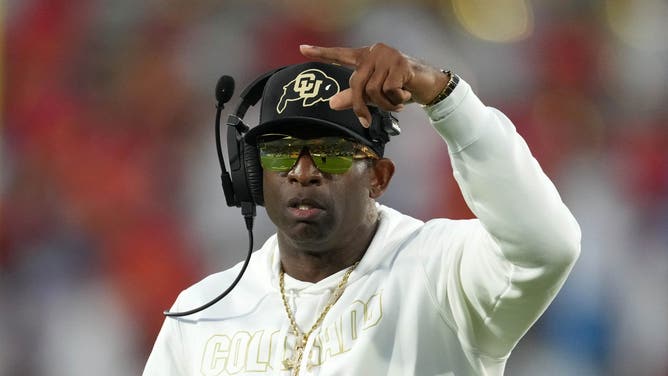Are We Closer To Having Just One Transfer Portal Period? Yes, NCAA Committee Wants To Eliminate Spring Period
The college football transfer portal could be about to undergo a major change that would certainly affect players and schools around the country.
As it stands, the transfer portal is open for two periods, one in December and the other starting during the spring. In what has been a chaotic time in the sport, we are now on the cusp of a radical change to the format.
The Division I Football Subdivision and Football Championship Subdivision Oversight Committees has recommended that college football gets rid of the spring portal period, and moves to a 30-day period that will start on Dec, 7 and run through Jan, 9.

Oct 28, 2023; Pasadena, California, USA; Colorado Buffaloes head coach Deion Sanders reacts against the UCLA Bruins in the first half at Rose Bowl. Mandatory Credit: Kirby Lee-USA TODAY Sports
We have seen a swell in support from coaches across college football that there should be only one portal period, with both periods lasting a total of 45 days, with 30 in the winter and a 15-day period in the Spring.
In a release from the NCAA, the move to change the length of the portal being open, along with only one period would benefit the student-athletes.
"The recommended change to a 30 consecutive day window allows schools and student-athletes to engage in conversations about future academic and athletics opportunities before the start of the spring academic terms," the NCAA release noted. "Data from the 2024-25 academic year showed that many football student-athletes made the decision to transfer after the end of the fall football season.
"Further, participation in spring football is typically seen as preparatory for the subsequent season; therefore, focusing on a fall notification-of-transfer window is expected to promote roster stability for student-athletes and their programs."
When Could New Transfer Portal Period Begin For College Football?
Simply put, if the move is adopted by the NCAA, this new period could start as early as 2025, and players looking to move-on from their school would have to do it during the 30-day winter period. This takes away the opportunity for players to transfer during or after spring practice.
While this could hurt a lot of players when it comes to seeing the field, especially if they are under the impression that playing time will be limited for them, or they are down the depth chart, the move makes sense from a roster standpoint.
Following the 2023 season, nearly 3,900 players entered the transfer portal, according to multiple websites. The problem for coaches following the portal closing in the winter is that they had no idea who would actually depart the program during the spring period. This left coaches having to make rash decisions about what their future roster would look like, while at the same time having to renegotiate with players on NIL terms.
Now with this move, schools would not have to worry about a player bolting for another program after a productive spring practice, and their rosters would be set for the upcoming season. This will certainly lead to players voicing frustration over not having the option to leave in the spring, but in the eyes of athletic departments, thirty days in the winter is enough time.
"If you transfer to one program, you need to stick with them for at least a year," one Power-5 head coach told OutKick. "This would also eliminate us having to deal with a plethora of guys deciding they can find better financial opportunities somewhere else after spring practice. If we're going to commit to a player, we should at least get a year with them. There are just too many rash decisions being made right now, and it's hurting the game."